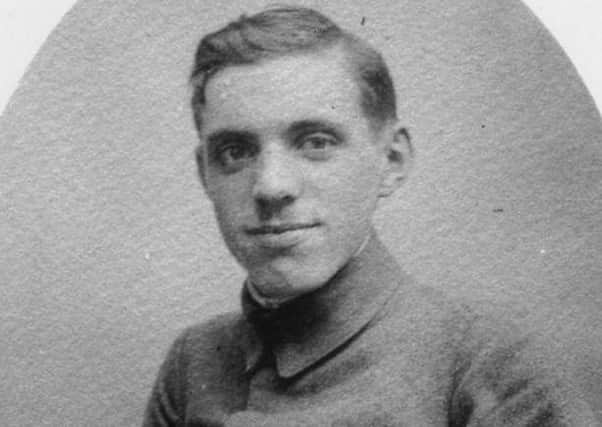Obituary: Ted Winkler, wartime airman


Eduard (Ted) Winkler, who has died two weeks before his 100th birthday, was a German-born engineer, businessman and charity organiser in East Yorkshire who remained in the county after arriving as a PoW, and whose story can be traced back to the Luftwaffe before the Second World War turned in the Allies’ favour.
Born in December 1920 and brought up in Hamburg, he was the son of Robert Winkler, a First World War veteran who had been fitted with a wooden arm as a result of a gangrenous hand wound incurred while defending the Hindenburg Line, for which he won the Iron Cross.
Advertisement
Hide AdAdvertisement
Hide AdMr Winkler Snr joined the Nazi Party in 1927 but lost faith with them after being refused entry to the Nuremberg Rally of 1933 because of his crippled arm. He died four years later when the gangrene reached his shoulder.
His son, meanwhile, had become fascinated with gliders, joining the Deutscher Luftsportverband sports club in 1932. When it was taken over by the Nazis, he became automatically a member of the Hitler Youth.
Uninterested in politics, he took an apprenticeship as an aircraft constructor, attending in his spare time jam sessions at the US Consulate in Hamburg, for which the he was denounced by the Gestapo for harbouring an interest in “degenerate music”.
His record marked him as “politically unreliable”, which meant he could never become an officer.
Advertisement
Hide AdAdvertisement
Hide AdHe was called up into the Luftwaffe in 1942 and two years later, after postings to occupied France, was selected to fly secretly in Field Marshal Albert Kesselring’s personal aircraft to manage the fitment of cannons to the Messerschmitt Me 262, the world’s first operational jet-powered fighter aircraft and a weapon which, Mr Winkler believed, could yet win the war for Germany. The installation he oversaw had not been sanctioned by Hitler.
But by the following year the mood had turned, and with Germany on the defensive, Mr Winkler found himself as part of the 7th Paratroop Regiment on the banks of the Rhine. Ordered to destroy his armourer’s tools and report with his pistol to the front line in Winnekendonk, he surrendered to enemy troops, holding aloft a leaflet dropped by the Allies promising safe passage for those who handed themselves in.
Listening to the soldiers discussing what to do with their prisoner, he deduced later that they were threatening to kill him.
He spent the next three years working in captivity, often on farms. At a PoW camp in Belgium, he was kept on rations similar to those in the concentration camps, and by May 1946, when he was moved to England, he weighed only seven stones.
Advertisement
Hide AdAdvertisement
Hide AdHe moved through 16 PoW camps and farms, mostly in Yorkshire. As a paratrooper, he was considered by the British to be one of the hard men of the Wehrmacht, and was kept deliberately isolated to prevent any involvement in the unrest back home over the policy of industrial dismantlement.
Instead, he started a business repairing clocks and watches, which he continued until late in life. He married June, née Steele, in Withernsea in 1947, but the marriage did not last. Released on the last day of 1948, he discovered there was a quota for ex-PoWs wishing to remain in Britain and, although it was full, managed to bribe an officer with a gold watch to have his name included.
He made his way to the Holderness coast, working on farms and beginning to practise his tool-making skills at Seathorne Steel Construction in Withernsea, despite an official ban on the employment of former PoWs in industry. He became a naturalised British citizen in 1954, and made tools for Blackburn Aircraft in Brough. Later he also worked for Shiphams, Imperial Typewriters and the crane firm, Priestman Brothers in Marfleet.
It was there he met his wife, Thelma, widow of the Hull City footballer, Harry Brown. They set up house together in Hedon, and Mr Winkler ended his career as a partner in Modern Metal Finishes.
Advertisement
Hide AdAdvertisement
Hide AdActive in the local community, he founded the Hedon Museum, spoke in local schools and became president of the retirees’ club, Probus. When Thelma died, he and some friends established a charity in her memory, The Hedon Flyer Trust, which owned and ran a bus for the elderly.
He became well-known as a local historian, establishing a photography archive and writing the history of aircraft manufacture in Hedon in the 1930s. He also specialised in coin collecting, owning at one time one of only three known examples of the Hedon Silver Penny, which bears the image of the 12th century King Stephen and was minted in the town.
Comment Guidelines
National World encourages reader discussion on our stories. User feedback, insights and back-and-forth exchanges add a rich layer of context to reporting. Please review our Community Guidelines before commenting.